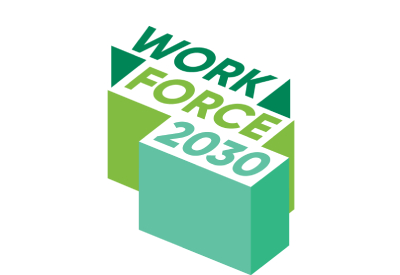Workforce 2030 Coalition Launches to Accelerate Ontario’s Building Workforce Capacity

July 23, 2020
As governments look to stimulus investments in infrastructure as a vehicle for economic recovery, there is an opportunity to support Ontario’s workforce to ensure the building industry can help meet Canada’s climate goals and create jobs, with equity and inclusion at the forefront. Workforce 2030, which launched July 23, brings together a broad, cross-sectoral coalition of employers, educators, and workers in the building sector in an unprecedented collaboration to fast-track workforce development.
Workforce 2030’s goal is to accelerate workforce capacity by collectively impacting government policy, business practices, and education. The Coalition is catalyzed by The Atmospheric Fund (TAF) and Canada Green Building Council (CaGBC).
The building industry is a proven cornerstone of economic recovery, able to mobilize shovel-worthy projects such as building retrofits and new low-carbon construction. The industry can play a critical role in Ontario’s recovery by getting people to work while helping reduce greenhouse gas (GHG) emissions, create healthier buildings, and improve resilience.
According to CaGBC research, government investment in a green recovery that prioritizes green building combined with progressive policy leadership could, by 2030, lead to over 600,000 direct green building jobs in Ontario and 1.5 million jobs nationally.
While the pandemic has the world’s focus, this remains the critical decade for climate action. Buildings can significantly contribute to Canada’s efforts to reduce carbon, as they account for almost 30 per cent of the country’s GHG emissions when including operations, construction, and materials. In urban centers such as Toronto, approximately half of all emissions come from homes and buildings. An investment in green building will create jobs that will be in demand for years to come as Canada transitions toward a low-carbon economy.
Workforce 2030 is funded by TAF and the Catherine Donnelly Foundation. The coalition work is guided by a senior leadership group of foundational partners, through an Advisory Board.
Workforce 2030 Advisory Board of Foundational Partners
- Julia Langer, CEO, The Atmospheric Fund (TAF)
- Akua Schatz, VP, Market Engagement and Advocacy, Canada Green Building Council
- John Cartwright, President, Toronto and York Region Labour Council
- Roselle Martino, Vice President, Policy, Toronto Region Board of Trade
- Sandro Perruzza, CEO of Ontario Society of Professional Engineers
- Andrew Pariser, VP and expert in labour relations, Residential Construction Council of Ontario (RESCON)
- Tony Cupido, Research Chair, Sustainability, Mohawk College and Board Member, Canada Green Building Council
- Rosemarie Powell, Executive Director, Toronto Community Benefits Network
- Bala Gnanam, Vice President – Energy, Environment & Advocacy, Building Owners and Managers Association (BOMA Toronto)
- Steven Martin, Business Manager, International Brotherhood of Electrical Workers (IBEW) Local 353
- Mike Yorke, President, Carpenters District Council of Ontario
- Surabhi Jain, Executive Director, Toronto Workforce Funder Collaborative
- Corey Diamond, Executive Director, Efficiency Canada
- Dr. Yogendra Chaudhry, Vice President, Professional Services, Eco Canada
Interested parties can learn more at workforce2030.ca and join the coalition by signing the Declaration of Participation.









![Guide to the Canadian Electrical Code, Part 1[i], 26th Edition– A Road Map: Section 56](https://electricalindustry.ca/wp-content/uploads/2022/11/Guide-CE-Code-2.png)






